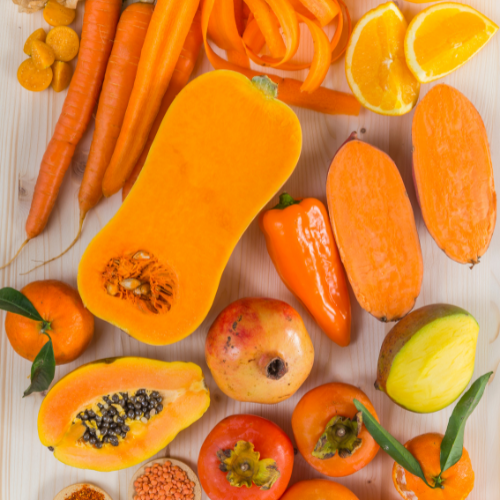
8 Orange Foods To Prevent Bowel Cancer and Colon Polyps
Your diet can play a role in safeguarding your colon’s health, so today, we’ll explore eight vibrant orange foods, each brimming with properties that could be your colon’s best ally.
Colon health might not be the trendiest topic in health discussions, but it’s undeniably crucial.
With the growing cases of bowel cancer and colon polyps, even among younger individuals, understanding preventive measures becomes more critical than ever.
And here’s the exciting part – some of these measures might be as simple as the foods you choose to include in your daily diet.
Now, let’s set sail into the realm of orange foods and uncover how they can be powerful allies in the battle against bowel cancer and colon polyps!
Let’s kick off our countdown with these delightful orange powerhouses—at number 8, sweet potatoes.
They’re not just delicious; they also bring some serious health benefits to the table, especially when it comes to your colon.
The vibrant orange hue of sweet potatoes is a visual cue to their high content of beta-carotene, a superstar antioxidant.
Beta-carotene doesn’t just give these spuds their gorgeous color; it also plays a key role in potentially reducing the risk of colon cancer.
Research published in the Journal of Nutrition and Cancer has highlighted the potential protective effects of beta-carotene against colon cancer.
This antioxidant’s ability to neutralize harmful molecules called free radicals may help shield the cells lining your colon from damage that can lead to cancer.
You see, when you consume foods rich in beta-carotene, your body converts it into vitamin A, a nutrient known for its protective effects on your colon.
It helps keep the cells lining your colon healthy and functioning optimally.
But that’s not all—sweet potatoes are like a friend to your digestive system.
Why? Because they’re loaded with fiber. Fiber is your colon’s best friend.
It keeps things moving smoothly, prevents constipation, and supports the overall health of your gut.
Next up on our list is the juicy, orange delight of summer—at number 7, cantaloupe.
Not only does it make for a refreshing snack on a hot day, but it also brings a heap of goodness to your colon health.
Cantaloupe is like a double dose of vitamins, with both vitamin C and beta-carotene, making it a true superfood for your colon.
Let’s break down why these nutrients matter.
First, we have vitamin C.
Cantaloupe is loaded with this vitamin, and it plays an important role in maintaining a healthy gut.
It supports the production of collagen, which is like the glue that holds your gut lining together.
A strong gut lining is essential for preventing issues like leaky gut syndrome, which can contribute to colon problems.
Now, let’s talk about beta-carotene, the same antioxidant we discussed with sweet potatoes.
Cantaloupe is another excellent source of this mighty compound.
Beta-carotene, once again, steps in as a colon protector.
Research suggests that it may help reduce inflammation in the colon, keeping it in top-notch condition.
Now, let’s talk about a versatile veggie that shines in the world of orange foods—number 6 is the humble, butternut squash.
This vegetable is not only a delightful addition to your meals but also a nutritional powerhouse that supports your colon health.
Butternut squash is a fantastic source of dietary fiber.
Fiber is like the broom of your digestive system; it sweeps away waste and toxins, promoting a clean and healthy colon.
A diet rich in fiber has been associated with a lower risk of colon polyps and cancer.
But the goodness of butternut squash doesn’t stop there.
It’s brimming with vitamins A and C, both of which play vital roles in colon health.
Let’s start with vitamin A.
Butternut squash is packed with this nutrient, and vitamin A is like a guardian for your colon cells.
It helps regulate their growth and repair, reducing the risk of abnormal cell changes that can lead to colon polyps and cancer.
Now, onto vitamin C.
This vitamin is well-known for its immune-boosting properties, but it’s also a key player in colon health.
Vitamin C helps combat oxidative stress and inflammation in your colon, creating an environment where polyps and cancer are less likely to develop.
Now, let’s talk about a tropical delight that’s not just delicious but also incredibly beneficial for your colon health – number 5, papaya.
This vibrant orange fruit is like a natural elixir for your digestive system.
Papaya is a powerhouse of two key nutrients: vitamin C and beta-carotene.
Loaded with vitamin C, papaya is renowned for its immune-boosting properties.
But its role in colon health goes even further.
The Vitamin C in papaya acts like a shield against harmful free radicals.
Free radicals are unstable molecules that can damage the DNA in your colon cells, potentially leading to mutations and the development of colon polyps or cancer.
Vitamin C swoops in to neutralize these troublemakers, reducing the risk of such damage.
Now, let’s talk about beta-carotene, which gives papaya its lovely orange hue.
Beta-carotene is converted into vitamin A in your body, and as we discussed earlier, vitamin A is like a guardian for your colon cells.
It helps regulate their growth and repair, keeping them in a healthy state.
But that’s not all—both vitamin C and beta-carotene have anti-inflammatory properties.
Inflammation can create an environment conducive to colon problems, so having these nutrients on your side helps reduce this risk.
Now, let’s talk about a fruit that’s often underrated but can be a fantastic addition to your diet for the sake of your colon—at number 4, Apricots.
These small, orange wonders are a concentrated source of two essential components for colon health: beta-carotene and fiber.
Rich in beta-carotene, apricots are like an internal bodyguard against harmful molecules known as free radicals that can damage the DNA in your colon cells, potentially leading to the development of colon polyps or cancer.
Apricots are also a fiber-rich fruit, and as we mentioned, fiber is a key player in maintaining a healthy colon.
When you consume fiber, it adds bulk to your stool and keeps it moving smoothly through your digestive tract.
This not only prevents constipation but also ensures that harmful substances spend less time in contact with your colon’s lining.
The fiber in apricots binds to certain toxins and carcinogens in your colon, helping to flush them out of your system before they can cause any harm.
So, by regularly including apricots in your diet, you’re providing your colon with the tools it needs to stay healthy and reducing the risk of polyps and cancer.
Now, let’s talk about a classic favorite that’s not only good for your eyes but also a star player when it comes to your colon’s health – at number 3, carrots.
These vibrant orange veggies are renowned for their rich beta-carotene content, and this nutrient holds the key to reducing the risk of colon cancer.
Beta-carotene, found in abundance in carrots, is a powerful antioxidant.
They help neutralize free radicals that damage our bodies.
But it doesn’t stop there…
Carrots bring even more to the table – their crunchiness.
You might not think of this quality as significant for your colon, but it plays a role in your overall digestive health.
When you bite into a carrot, that satisfying crunch isn’t just enjoyable; it’s also aiding your digestion.
Chewing crunchy foods like carrots stimulates your salivary glands, kickstarting the digestive process.
This initial breakdown of food in your mouth sets the stage for more efficient digestion in your stomach and intestines.
Moreover, chewing crunchy foods promotes healthy teeth and gums, which are essential for proper digestion.
When your teeth are in good shape, you can effectively break down your food into smaller, more digestible pieces.
So, next time you munch on a carrot, not only are you giving your eyes a boost but also supporting your colon’s health by reducing the risk of colon cancer.
Enjoy them as a snack, add them to your salads, or dip them in hummus for a satisfying and nutritious treat that’s good for your colon and your overall well-being.
Now, let’s talk about a seasonal favorite that’s not just for carving spooky faces—number 2, Pumpkin.
This vibrant orange squash is a powerhouse of nutrients, making it an excellent choice for your colon’s health.
First up, fiber. Pumpkin is packed with it, and fiber is like a broom for your colon that helps sweep away waste and toxins, keeping your digestive system running smoothly.
A healthy dose of fiber in your diet can contribute to regular bowel movements, which is crucial for colon health.
When waste lingers in your colon for extended periods, it can increase the risk of polyps and even colon cancer.
Pumpkin’s fiber content helps prevent this by ensuring waste is efficiently eliminated from your body.
But that’s not all—pumpkin is loaded with beta-carotene, the same powerful antioxidant we’ve talked about with other orange foods.
Beta-carotene is your colon’s guardian, shielding it from potential harm caused by free radicals and inflammation.
Pumpkin also boasts anti-inflammatory properties.
Inflammation in the colon can be a precursor to more serious conditions.
Pumpkin’s anti-inflammatory compounds work to calm your colon, keeping it in a state of balance and reducing the risk of inflammation-related issues.
And finally, we’ve arrived at the top of our list—the humble Orange.
These citrus wonders are not only a burst of sunshine in your day but also a potent ally in the fight against colon cancer and polyps.
Oranges are famous for their high vitamin C content, and this vitamin isn’t just great for boosting your immune system; it’s also fantastic for your colon.
Here’s why:
First, vitamin C is a powerful antioxidant.
It patrols your colon, neutralizing harmful free radicals that can lead to cellular damage and inflammation.
By reducing inflammation, vitamin C helps create an environment in your colon that’s less conducive to the development of polyps and cancerous growths.
But there’s more to the story.
Vitamin C is also known to support the body in repairing damaged DNA, which is a critical factor in preventing cancer.
It helps ensure that your colon cells continue to function correctly and don’t mutate into cancerous ones.
Additionally, oranges are rich in dietary fiber, another essential component for colon health.
The fiber in oranges aids in digestion and promotes regular bowel movements, ensuring waste doesn’t linger in your colon, where it could potentially contribute to the development of polyps.
So, by enjoying a juicy orange as a snack or adding orange segments to your salads and desserts, you’re not only treating your taste buds but also giving your colon some much-needed love and protection.
And there you have it—eight vibrant orange foods that can make a significant impact in the battle against bowel cancer and colon polyps.
By embracing these nutrient-rich foods in your daily meals, you’re empowering your colon with nature’s finest defenders.
Remember, your colon health is paramount to your overall well-being.
If you ever have concerns about your digestive health or encounter unusual symptoms, please consult a healthcare professional promptly.
Your gut’s well-being is fundamental, and it deserves your utmost attention.
Stay informed, nourish your body wisely, and prioritize your gut health.
We wish you a vibrant and wholesome journey ahead!









